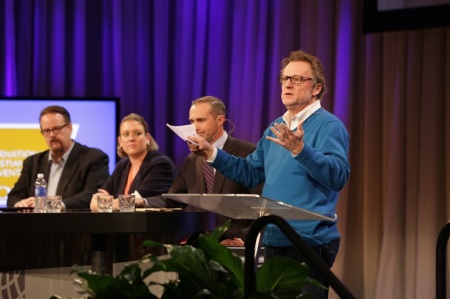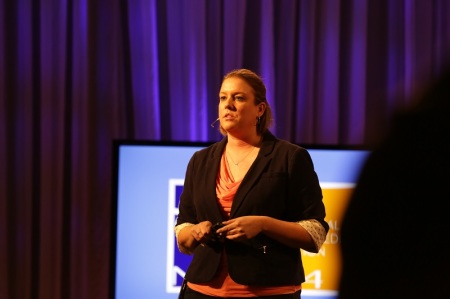People No Longer Trust Traditional Media, Go to Family and Friends on Social Media for News, Says Facebook Speaker at NRB

NASHVILE, Tenn. – By way of of social media, people look more to their friends and family for reliable information, including shared links to news stories, a Facebook manager for policy told Christian media professionals during the opening session of the National Religious Broadcasters Convention on Saturday.
"People no longer trust, I'm sorry to say, TV, radio, newspapers, campaigns, organizations – they don't trust them as much," said Katie Harbath, during the conferences first keynote session. Her work at Faceback focuses on political outreach. "But what they do trust is when that information comes from a friend or family member."
Harbath explained, "Facebook is increasingly becoming a place for people to find new information and new organizations because yes, it's true that they are going there to see my cat pictures or baby pictures or vacation pictures of their friends, but while they are doing that they are getting news and information, too. They are seeing the headlines, they are clicking on links."
She pointed out that during this new technological era, an organization's website homepage might not be the place that gets the most traffic.
"It's going to be the stories [dealing] with issues, the back pages, that you (media and ministries) are driving people to on social media, that friends are sharing with friends, that they are having these conversations on them," Harbath said.
She made her comments during a panel discussion on social media led by filmmaker and media consultant Phil Cooke, who opened the conversation by saying it was important to know what Christian media should be focusing on this year "when it comes to your web presence, blogging, when it comes to digital media of all kinds."

The panel included LifeWay President of Research Ed Stetzer, and Ligonier Ministries President Chris Larson.
"You are the ones to go out and continue to proclaim that message to as many people as possible," Larson told the several hundred media professionals in attendance. "We can't think of Jesus as just having a Facebook page and having him 'Liked,' that's not discipleship. Instead, with all of our social media, whatever means comes next, [whether it be] Facebook, Instagram, all the other dotcoms, and the other types of technologies, … you have to pay attention to that, you have to figure out, how does this make sense?"
He added, "There's a lot of trolls on the Internet, there's a lot of discouraging things on the Internet." Pointing to the fact that it's "not the Internet's fault," and instead, "human nature's fault.
"It's not what comes into a man that defiles him, but it's what comes out of him. That's what defiles a person, that's what corrupts the Internet. So, I would charge all of us [in the Christian media] so that no corrupting talk would come out of our mouths, but speak only such as is good that is for building up."
NRB held its first "Digital Media Summit" the day before the official opening of the conference that proved to be popular conversation on Twitter among social media experts, especially those representing Christian organizations, officials said. The organization plans to host another summit at next year's annual event.
Follow NRB's convention tweets here: @NRBConvention.





















